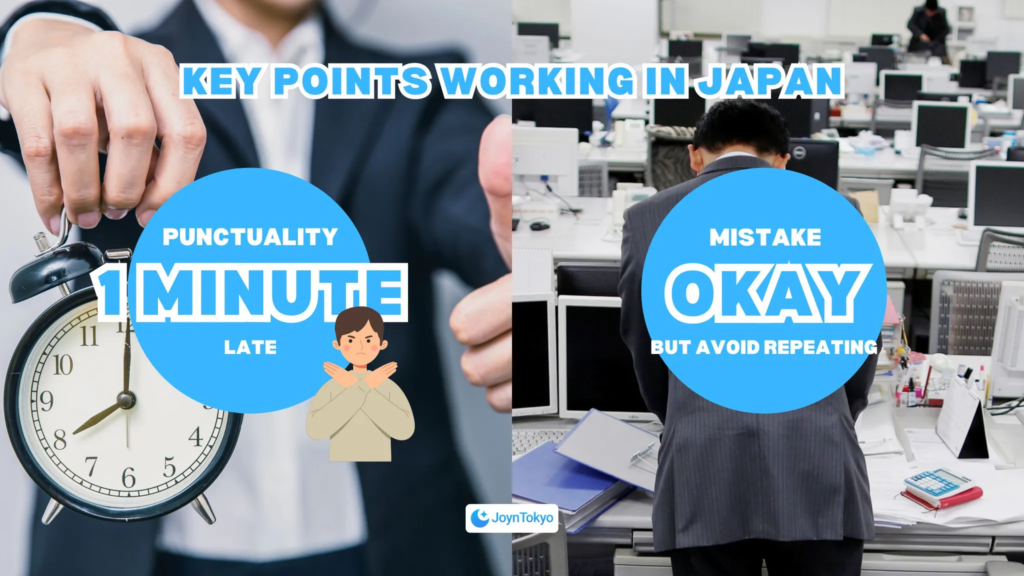Moving to Japan and starting a new job can feel both exciting and daunting. When I first arrived, I joined a company with a Western owner but a workplace culture that was very much rooted in Japanese traditions. Below, I’ll share my observations, experiences, and insights on what you can generally expect when working in a Japanese office. Keep in mind that each company can differ, so consider these as broad guidelines rather than absolute rules.
Key Differences

Even among diverse workplaces, there are several recurring themes in Japanese office culture. Here are some things you’ll need to be aware of, some of which I knew about before I came, others I discovered during my time here.
Punctuality Matters
In Japan, punctuality often means arriving not just on time but slightly early. Even a one-minute delay typically calls for an apology, and if you’re running behind by five minutes or more, it’s crucial to notify your manager as soon as possible. While most companies understand unavoidable delays such as train issues, open communication about your arrival time is essential. This emphasis on punctuality fosters an environment of respect and reliability. It’s not like back home, where you can come in a few minutes late and just carry on, here, you might get a little bit of side-eye.
Like many people, I’ve occasionally had a train delay, or a personal emergency or even, on occasion, overslept by a few minutes. But people are generally understanding, and as long as you let your manager know why you’re late, and how long it will be, you should be fine — but don’t make a habit of oversleeping.
Dealing with Mistakes
Japanese businesses generally accept that everyone makes mistakes. However, the underlying principle I’ve found is “Make a mistake once, learn from it, and avoid repeating it.” Frequent errors, absences, or lateness without proper notice can harm your reputation. Apologies are important, but consistent improvement carries more weight. Recognizing and taking responsibility for errors is key. Again, I’ve messed things up because I didn’t know the right way to do them, but as long as you learn from it and remember not to do it again, people are forgiving.
Common Misconceptions

There are a few widespread ideas about Japanese workplaces that are essentially stereotypes, things that even I thought would be true until I arrived here. Below, I’ll address those misconceptions while clarifying how things often work in modern offices.
Overtime and Overwork
Like a lot of newcomers, I was initially worried about the possibility of endless overtime. While some companies do have demanding schedules, it’s not always as extreme as stereotypes suggest. If you’re late by 15 minutes, you’re typically expected to make that time up. However, the notion of staying in the office until your boss leaves is no longer a thing in many modern workplaces. If a deadline looms, it’s normal for everyone to put in extra hours — I’ve been in past 9pm during crunch time on more than one occasion — but that’s often project-based or occasional rather than a daily expectation. Generally, leaving on time is perfectly acceptable, and many bosses do the same.
Workplace Atmosphere
Another misconception is that Japanese offices are stern and unfriendly. But in my experience, while some offices may have less casual chatter than their Western counterparts, camaraderie and celebration still exist. I’ve personally seen people celebrate birthdays, engagements and marriages are toasted, and even major sporting events can briefly pause the workflow. People may wear headphones and focus intently, but it doesn’t mean they are cold or unapproachable.
Important Points to Note

Beyond punctuality and company culture, there are other things that newcomers should be aware of. Here’s just a few that I picked up on in my first few months working here.
Drinking Culture
Many Japanese companies use after-work drinking events (at an izakaya or bar) to break down formal barriers and strengthen team bonds. While you’re never forced to drink alcohol, people might think you’re a little off if you miss them with no good reason. These gatherings, often paid for by the company, let people relax and socialize in a more informal setting. Just be prepared: you might see a more uninhibited side of your colleagues as the night goes on! I’ve had some terrific nights out on the company dime, eating and drinking; but I’ve also seen a superior slurring their words and nearly losing their composure. It’s a mixed bag, but if you remember that it’s all about fostering friendships, you’ll be fine!
Appearance Expectations
Dress codes in Japan can be stricter than in some Western workplaces. Men with very long hair may be asked to trim it, and patchy facial hair is often discouraged. I prefer to keep my hair long, but was told once that a trip to the barber was neetjapnded urgently, and to keep my whiskers in check. Suits and ties aren’t mandatory everywhere, but you should keep at least one crisp, clean suit on hand for client meetings or more formal events. You never know if there could be a client meeting, or a pitch to a vendor: once or twice I was essentially a “body in the room,” but it was vital I had a suit for these occasions. These expectations can vary depending on the sector and company size, so always check your firm’s specific guidelines.
Conclusion
Working in a Japanese office can be an enriching experience that isn’t necessarily a massive leap from Western norms. While being punctual, effectively handling mistakes, and participating in social events might matter a little more, much of the day-to-day routine is comparable to other offices worldwide. The key is to stay flexible, see how others around you behave, and be willing to adapt. By doing so, you’ll likely find your work life in Japan both rewarding and memorable. Good luck on your journey!

